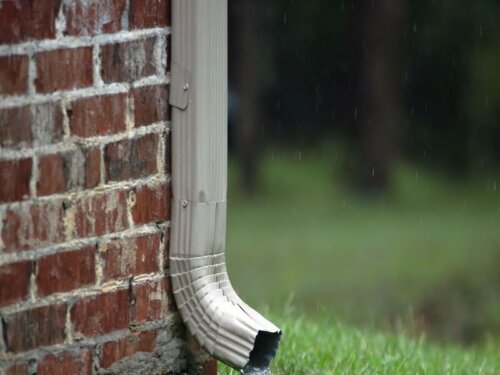
Give us a call today: 613 791 5777 for a free upfront estimate!
Debris and leaves can accumulate on your roof and slow down or obstruct the smooth flow of rainwater in your drainage system. During winter, this situation can cause the roof drainage to freeze because pooled water at the elbows of downspouts can quickly turn to ice. Sometimes, snow can also settle at the bottom of gutter, causing a blockage and freezing in the drainage and many drain and plumbing problems.What Are Gutters And Downspouts? What They Do?
Gutter: It is a shallow trough fastened under the edge of your roof for directing rainwater to the drainage system. Downspout: A downspout is a vertical pipe attached to gutter installed along the edge of a building to help channel melted ice or rainwater down from the gutter to the drainage.Whether you are installing a new gutter system or cleaning or repairing an existing one, ensure that you have sufficient time to plan and complete your project before winter in order to avoid possible plumbing issues related to that. Let us explore how you can maintain your rainwater drainage system before and during the winter.
3 Ways to Prepare Downspouts For Winter.
Here are a few tips you can use to help prevent frozen rainwater drainage system in winter.1. Clean them
Remove dirt and leaves from the bottom of your downspouts. A clogged roof drainage exit is more vulnerable to ice buildup because the spot accumulates standing water.2. Heat tape
Encasing your downspouts with quality heat tape helps prevent freezing.3. Gutter guards
Installing gutter screens can help prevent twigs, leaves, and dirt from getting into your downspouts. Quality gutter guards help reduce the frequency at which you clean your roof drainage and keep away snow and ice from obstructing your roof drainage system.Are Downspouts Necessary?
Yes. Strong wind can blow icy water under your roof, causing ice buildup, which can damage your home’s foundation and compromise its structural integrity. Downspouts direct rainwater or thawed ice away from beneath your roof, windows, doors, and siding. They help prevent the formation of ice dams around your outside wall where rainwater from the roof hits the ground. Gutter and downspout can reduce the effect of snow and water on your siding landscape and basement.Is It Good To Remove Downspouts In Winter?
No, removing your downspouts and installing them again can be costly and may cause more damage to your drainage system. Alternatively, you can ask our licensed plumber to help repair and clean your downspouts before winter. Rather than remove downspouts in winter, plumbing experts prefer to disconnect downspout extensions installed at ground level. You can also avoid detaching your downspouts if you lay deicing cables in gutters and downpipes.3 Top Reasons Why You Should Remove Your Downspout Extensions In Winter.
Although some downspout extensions cannot be removed, homeowners preparing for winter should consider detaching ground-level pipes connected to downspouts. Both flexible and rigid extensions can hamper the smooth flow of clear water from your roof because the slow speed at which it flows through these pipes can lead to freezing issues. Here are three reasons you should disconnect downspout extensions in winter.1. Ice buildup
What causes freezing in the extensions is the water that lodges in the pipe because of the positioning of the pipes horizontally along the ground. The water in the pipe solidifies, creating a blockage at the bottom of the downspout.2. Damaged pipes
Flexible downspout extensions are often in clear view on top of the ground. During severe cold, snow may accumulate on the surface and can cover these pipes. The weight of snow and ice can break or cause cracks in these pipes.3. Water logging
During heavy downpours in winter, rainwater can overflow into your neighbor’s yard or flood your driveway, obstructing your movement. Before working on your downspout, you can confirm with your local authorities the rules and regulations for disconnecting downspouts in residential areas.What Downspout Extenders Are Good For Winter?
A good extension suits your landscape style and will work best to remove water further from your foundation to a safe disposal area. Here are the top 5 extenders homeowners can consider installing in winter.1. Stealth Flow Pipe.
These extenders consist of reusable quality ABS plastic, which can withstand harsh sun rays and heavy ice or snow impact. A stealth flow pipe is a state-of-the-art downspout extender that you can conceal with little effort.2. Rain Barrel.
Besides helping you keep rainwater away from your home’s foundation, you can use the water in your rain barrel to irrigate your vegetable garden and plants. However, different states or cities may have varying rules and regulations that govern the use of rainwater. You do well to consult your local authority before reusing the water you collect in your rain barrel.3. Splash Blocks.
You can choose a wide or narrow splash block depending on the amount of rainwater you need to divert further from your home’s foundation. Although these extenders can handle heavy runoff, it is good to keep checking on the blocks because pedestrians or visitors can knock them out from under the downspout spot.4. Buried Drain Pipe.
This type of extender includes a self-regulating heating cable installed through the gutter system and down to the underground drain pipe. Although the buried drain pipe is initially costly to install, it is an effective solution for maintaining a functional gutter drainage system in winter.5. Aluminum Extenders.
Many homeowners consider installing aluminum extensions because these extenders can effectively channel heavy, regular, and small amounts of rainwater.Getting Your Gutters Ready For Winter.
Here are six tips to help you prepare your gutters to collect rainwater off your roof effectively during the winter.1. Prune Branches.
Dense foliage over the roof of your house can cause a blockage in your gutter system. Homeowners can cut down stems or branches to reduce the volume of dead leaves falling on the roof and gutter.2. Inspect Your Gutter for Damages.
Looks can be incredibly deceiving, particularly if you look at your roof from the ground. You may not notice a loose screw on your gutter until the winter storm blows your gully from the rooftop. That is why you do well to consult a professional downspouts expert to inspect your gutter to check for leaks, cracks, and uneven guttering. An expert can advise you on the matters that need resolving before winter.3. Clean and Repair Damages.
Climbing on top of your roof can be challenging. You can slip and fall if you do not have the recommended safety gear. A professional plumber can help remove dirt and debris from your gutter and repair or replace broken sections with new replacement parts.4. Install Gutter Screens.
Gutter screens can consist of nylon or wire mesh. You can place a gutter guard over the upper side of your gutters to prevent leaves and twigs from accumulating in your rain trough. This approach to helping prevent freezing in your gully is a cost-effective solution to help keep your gutter clean and enable a smooth flow of drain water to the drainage.5. Sloped Gutters.
Naturally, a slightly sloped gutter is more efficient at draining rainwater to your downspouts than a flat one.6. Roof Insulation.
Uneven or underperforming attic insulation can contribute to the formation of ice dams in your gutter. Professionally insulated roofs enable the shingles to remain cold, which stops snow on your rooftop from thawing in winter and overflowing your gutter system.Choosing Gutters For Winter
Every home is unique. Thus, there is no one gutter type that fits all. It is wise to consult a top gutter installation expert near you to find the solution that fits your structure. A good gutter can withstand heavy downpours, storms, and the weight of snow. If you experience rainy seasons of over one season, you need to install strong, wide rainwater drainage system. You can consider selecting from the following.-
- Copper Gutters
-
- HalfRound Gutters
-
- Steel Gutters
-
- K-Style Gutters
-
- Aluminum Gutters
Why Dr. Pipe Drain and Plumbing Services?
Many companies offer licensed plumbers, but Dr. Pipe Drain and Plumbing Services also offers respect for your home and your time as our standard. This means from the time you call us, we are committed to making your entire experience as customer friendly as possible. We coordinate times that work with your schedule and call when we’re on our way. Our plumbers keep our areas neat and covered while working. In our projects, we use the most appropriate solutions to work quickly and efficiently. Our strengths do not only lie in plumbing. We can also help to navigate the insurance companies and city red tape. You will receive all the necessary permits for our jobs. We will guide you through the City of Ottawa rebates for which you qualify. Our customers love us, and our work is the best quality. Stop by our testimonials page, then give us a call to set up your free, no-obligation inspection.Give us a call today: 613 791 5777 for a free upfront estimate!




